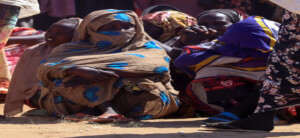Sudan’s trade balance deficit nearly tripled in the past year
The deficit in the trade balance for the first quarter of this year rose to $1.22 billion, an increase of nearly two times over the same period last year when the deficit was $477 million, further threatening Sudan’s economy.
 Sudanese Pounds (Radio Dabanga)
Sudanese Pounds (Radio Dabanga)
The deficit in the trade balance for the first quarter of this year rose to $1.22 billion, an increase of nearly two times over the same period last year when the deficit was $477 million, further threatening Sudan's economy.
According to a report by the Central Bank of Sudan, exports in the first quarter amounted to $1.39 billion and imports $2.62 billion.
In an interview with Radio Dabanga’s Sudan Today programme, Professor of Economics at El Nilein University in Khartoum Dr Hasan Bashir said that a significant rise in the trade balance deficit despite the end of the Covid-19 pandemic is an indication of the stifling crisis in the Sudanese economy.
Dr Bashir explained that export volumes could have been 10 times the size of current exports and highlighted the continued smuggling of large quantities of gold from the country.
He described the volume of sesame, groundnut, and cotton exports as “modest” due to problems in the agricultural season. “This year would have been the year of the start of the Sudanese economy before the country entered the current comprehensive crisis that affected all walks of life,” he said.
Financial aid suspended
Before the coup, former Prime Minister Abdallah Hamdok’s government had managed to clear Sudan’s debt arrears and secure funding from the international community.
Billions of international aid, however, were suspended as putschists under the leadership of Lt Gen Abdelfattah El Burhan took power in the October 25 military coup d’état. The value of the Sudanese Pound plummeted further and the economy declined.
El Burhan went on a regional tour in March, hoping to secure funds from Gulf countries and Russia as Western donors suspended their financial support. He returned disappointed as the United Arab Emirates and other allies did not provide extensive funding.











 and then
and then